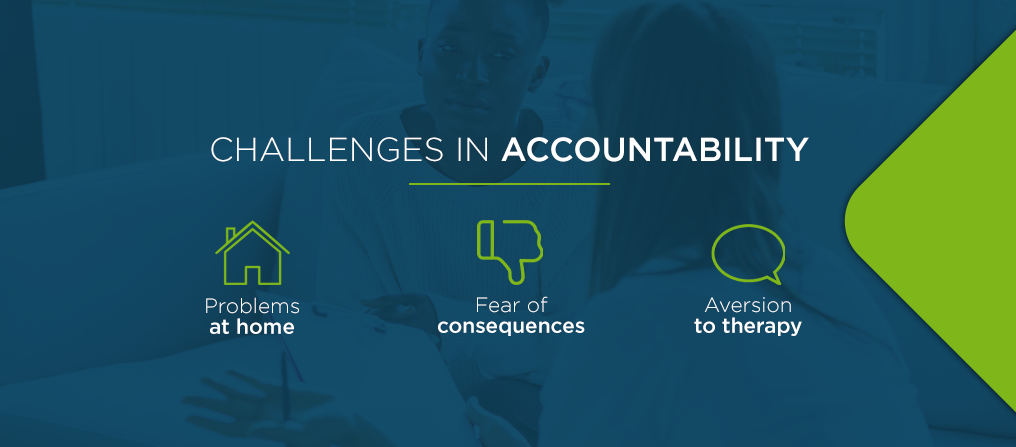How Is Accountability Measured in Healthcare?

Accountability is a challenging word to unpack. It has many dimensions and applies to all healthcare workers and patients, including psychologists. If you're a behavioral health professional and want to improve accountability in your practice, we hope to help you in this post. We'll explore the meaning of accountability, how it relates to your relationship with clients, how it's measured and what challenges you might encounter.
Table of Contents
- What Is Accountability in Health Systems?
- Why Is Accountability Important in Healthcare?
- How Is Accountability Measured?
- Accountability Best Practices
- How to Encourage Accountability
- Challenges in Accountability
- Improve Accountability With ICANotes
What Is Accountability in Health Systems?
Accountability is the idea that individuals are responsible for their actions and obligated to explain their choices. Generally, being able to justify your actions leads to a reward. Not being able to explain an error or wrongdoing brings consequences.
An example of healthcare-related accountability is if a supervisor asks a staff member to explain a documentation mistake. Other examples of accountability include answering to an insurance company or addressing residents' health concerns in a public meeting. Accountability has many meanings in governance, law and ethics, but it is not reserved solely for policymakers. Accountability plays an important role in your relationships at work and at home.
For instance, accountability is a critical component of the client-therapist relationship. As a behavioral health professional, accountability means putting the client's best interests first and always being able to justify your actions. It also means complying with privacy laws and ethical codes of conduct to protect your clients' confidentiality and safety. For clients, accountability may mean explaining why they decided not to follow their treatment plan or take their medication.
Accountability can encourage patients to participate in their treatment and recognize their influence on their mental and physical health. When clinicians and patients work as a team and accept responsibility for their individual actions, clients are better positioned to reach their health goals.
Why Is Accountability Important in Healthcare?
Accountability is critical in all aspects of the healthcare system, from government health policies to employee training programs. Without accountability, healthcare facilities and counseling practices risk decreased morale and productivity, ultimately reducing patients' quality of care. With accountability, you and your staff members are prepared to rectify mistakes, find solutions and commit to responsibilities rather than make excuses. Accountability allows you to learn from errors so you can improve your practice's reputation, reach business goals, decrease the risk of lawsuits and improve client satisfaction.
Healthcare workers are not the only ones who should embrace accountability. Patient accountability in healthcare is equally important and can lead to positive treatment outcomes. When patients accept their role in their health and acknowledge the obstacles that keep them from reaching goals, they can change negative behaviors.
How Is Accountability Measured?
Accountability is more likely to increase if it can be measured. If there's no way to prove someone is accountable for a mistake or failure, there's less incentive to put effort into a task. In general, healthcare facilities measure financial and performance accountability. Financial accountability involves tracking and reporting the use of monetary resources. Performance accountability may refer to measuring how well clinicians and staff members meet goals or score on patient satisfaction surveys.
Regarding the client-therapist relationship, measuring accountability can help clients who struggle to progress or change harmful behaviors. You might set a time to discuss accountability with clients and evaluate their development every so often. During this meeting, talk with the client about how far they've progressed, where they currently stand and where they're heading. If the client isn't accomplishing any goals, ask them questions and determine what needs to change.
Make sure they understand you're trying to find solutions and are not interested in punishing them. You might ask questions such as:
- Why are some tasks not completed?
- Are some activities not important to you?
- Are some activities too difficult to complete?
- Did you set time aside to complete the task?
- Did something unexpected happen to prevent you from finishing an assignment?
Regularly checking in with your clients may motivate them to accept accountability rather than make excuses for not following their treatment plan. Encourage clients to discuss what works for them and what doesn't seem to help, including if they need to focus on something different. Traditionally, therapists use treatment plans to discuss goals and objectives, but you may also use rating scales or checklists to track progress and treatment effectiveness.
Since accountability is a two-way street, consider your own performance when patients take assessments, or ask clients to complete a brief and anonymous patient satisfaction survey. By measuring your performance, you can grow professionally and improve client outcomes.
Accountability Best Practices
There is a right way and wrong way to approach accountability. Employees and clients should understand that accountability is not about blaming, getting angry or making others feel guilty. It's about finding solutions and working together to accomplish goals. Here are a few best practices to keep in mind:
- Know the reasons: Make sure you and your clients understand your actions and the purpose of their treatment goals.
- Consider your qualifications: Always ensure you're qualified and trained to provide a service your client requests before taking action.
- Agree on treatment: Any steps you take to help your client should be part of an agreed-upon plan.
- Set clear boundaries: You may need to ensure your client understands your role by establishing clearly defined boundaries.
- Monitor and evaluate: Keep track of your client's progress, so you can identify issues early and make recommendations. Spend time periodically assessing the effectiveness of a client's current treatment plan.
- Help employees change: Make sure employees understand the importance of accountability in your practice and how it impacts patient care and your facility's success. Encourage employees to share their thoughts and feelings.
- Make it easy: The concept of accountability can feel overwhelming to both clients and staff. Focus on changing one behavior at a time.
- Be honest: Part of accountability is being honest. Set an example by being honest if you make a mistake and encourage employees to do the same.
How to Encourage Accountability
If you wish to understand the psychology behind not taking responsibility, consider this study published in the Personality and Social Psychology Bulletin. According to the study, people might avoid accountability because it feels threatening to accept blame. However, people are more likely to take responsibility if they view wrongdoings as a chance to grow as a person. Keeping this in mind along with the following tips, you can create a culture of accountability in your practice.
Begin With Collaboration
Ensure clients understand that change happens internally and that you must work as a team to help them overcome difficulties and improve their behavior. Let them know you're there to help them make sense of their priorities and transform these into real goals, but they still have to do their part to make things happen. Lastly, remind them that it's better to be honest if they can't reach a goal rather than make an excuse.
Set Clear Expectations
Setting clear expectations is an essential part of accountability. Clients or staff are not likely to put their best effort into reaching goals if they don't know what's expected of them or why they are working toward a specific goal. Be sure to express what you're hoping to achieve and how clients or employees should complete tasks.
Go over the rewards of reaching goals and how clients and staff can know they were successful. Invite others to share their ideas and concerns. Find out what they want, what expectations they have and what issues they might be experiencing. You'll want to get everyone on the same page for easier collaboration and increased willingness to share thoughts.
Discuss Capabilities
Clients can't reach goals if they do not have the skills or resources needed to complete certain activities. To avoid accountability issues in the first place, set clients and staff up for success by making sure they are capable of doing what's asked of them. Consider what specific tools they might need to achieve certain objectives. Can they obtain these things if they don't currently have them? What can you do to make that process easier?
Determine How You'll Measure Progress
You and your clients should set clear, measurable treatment goals and objectives together and agree on how you'll measure their progress. Find out how much time your client is comfortable spending on assessments or other tools to gauge treatment effectiveness.
Give Feedback
Continually check in with clients and discuss their thoughts and feelings about their therapy sessions. Consider what each client says or use a rating scale to get feedback. A rating scale can show you if clients are satisfied with your services, which clears up ambiguities.
You'll also want to provide feedback and share your thoughts about a client's progress. Encourage open communication and remind the client that you want them to have a more satisfying experience. If you find that something isn't working, brainstorm a solution with your client to help them stay on track.
Build a Strong Connection
If clients resist adopting accountability and working on treatment goals, you may need to give them more time to develop a greater sense of trust. Also, make sure you set agreed-upon goals. Clients must feel ready to change. Otherwise, they may resist moving forward.
Your relationship with your client is critical to improving accountability for both of you. If a client feels a strong connection with you, they are more likely to share their true feelings, thoughts, needs and anything else required to help them change and accomplish goals. They are also more likely to admit mistakes. Ensure they know you're there to help them find a solution if they're having trouble reaching goals.
Acknowledge Success
Whether you're working on building accountability in your practice or helping clients get motivated, make sure to acknowledge accomplishments. For example, you might ask clients to identify activities they enjoy, whether that be watching a favorite TV show or eating a piece of candy. Encourage them to reward themselves after they complete therapy-related homework assignments.
Provide Tools
You can help your clients be more accountable and complete tasks by offering technological tools that make it easier for them to manage their health. For example, you can use an electronic health record (EHR) system that provides a patient portal. Clients can use the patient portal to access their medical history, manage appointments and request refills. Other features, like automatic appointment reminders, help clients prepare for therapy sessions and get to appointments on time.
Overall, you can use technology to give clients greater control of their care and help them be more accountable.
Challenges in Accountability
Creating a culture of accountability is not always easy for various reasons. If you find that clients or employees struggle with accountability, try to identify and address the root cause. Some possible reasons clients may have trouble with this concept include:
- Problems at home: Clients may face issues such as financial instability or lack of support at home. Some obstacles may prevent them from focusing on achieving treatment goals and improving their mental and physical health. If you find clients struggling to reach goals due to challenges at home, you may need to adjust their treatment plan to suit their situation better. Remind them that they can still change their behavior to improve their health, even if they need to take baby steps.
- Fear of consequences: If employees or clients worry about the repercussions of making mistakes or failing to reach goals, they're less likely to embrace accountability. Remind staff members that everyone makes mistakes sometimes, and help employees or clients feel safe reporting errors or expressing their concerns.
- Aversion to therapy: Some clients may be pushed by a loved one to meet with a counselor. Others may be mandated by the court to receive treatment. If clients feel they don't need therapy, they might challenge accountability. Resistant clients require patience, empathy and creativity. You may need to find new ways to interact with them. Allow time for them to trust you. Once you build a connection, they'll be more likely to work to change their behaviors. If you feel stuck along the way, consider turning to peers for support.
Improve Accountability With ICANotes
Using a secure, timesaving EHR system like ICANotes can help you increase efficiency and support accountability in your practice. With ICANotes, you and your employees can enjoy features such as convenient note-taking templates, a telehealth platform, a patient portal and billing solutions.
You and your staff can decrease errors and spend less time on documentation, allowing you to improve your accountability and reach goals as a team. If you would like to experience ICANotes firsthand, sign up for a free trial. For more helpful healthcare tips, please browse our blog.
Related Posts:
Top 7 Things You Need to Know About Starting a Private Practice
Top 5 Reasons Behavioral Health Professionals Get Sued
What Are the Most Important Practice Management Features for Behavioral and Mental Health Clinicians?
How to Prepare for an Insurance Treatment Review




